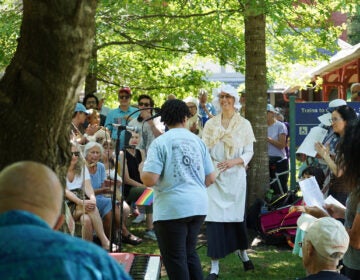Greene Street Friends grad returns to talk about nanotechnology and storytelling
Author, ethicist and futurist Rosalyn Wiggins Berne will return to Germantown this week to speak at Greene Street Friends School, the scene of her sixth-grade graduation in 1969.
“The influence of the Friends education goes deep inside of me,” she said during an interview with NewsWorks several days before the event.
One book leads to another
She was referring to how her first book, “Nanotalk: Conversations with Scientists and Engineers about Ethics, Meaning and Belief in the Development of Nanotechnology,” led to a novel published after several fitful years.
“That’s an entirely scholarly book that I wrote, because when you’re a professor, that’s what you do,” said Berne, an associate professor in the University of Virginia School of Engineering and Applied Science. “Scholars primarily write for scholars. We have our own language, our own way of writing, our own publishing companies.”
In the research process, she asked scientists from across the country several questions including:
What are the impending ethical dilemmas of a world of ubiquitous webcams, where machines are tiny enough to travel in our own blood vessels, robots look and act like humans, and the average life-span is ever-expanding?
Can we mimic the previously invisible molecular work of Mother Nature? Can we improve upon it? Should we?
She said that after a long day of interviews at Columbia and New York Universities, she suddenly began writing something entirely different.
The questions with which she’d grappled became the seeds of her first novel.
“My subconscious had to do something with everything I was learning about,” she said of “an explosion of subconscious material that explored, through my moral imagination, where we’re going and what we’re doing with all this.”
The Quaker influence
Returning to her childhood roots, she dug into writing “Waiting in the Silence” which weaves elements of Quaker history with questions of how future technologies will shape relationships, sexuality and reproduction.
The title is a double entendre on the silence that Quakers use for worship “and also the process of waiting [until] we have a clear sense of where to go and what to do with our lives,” she shared.
Shifting from academia to publishing fiction proved to be a major challenge.
After spending six years in pursuit of a publisher — “Nanotalk” was released in 2005 — Berne was ready to give up.
Prediction comes true
When she told her daughter she was going to set the novel aside once and for all, the response she got was, “No, no, no! I had a dream: A publisher is going to say ‘yes.'”
The daughter also predicted a publisher with a one-syllable name beginning with “S” would materialize.
Berne scoured a list of publishers and sent her manuscript to a new company called Spore Press.
Within two weeks, she said, she was told “Waiting in the Silence” was exactly what they were looking for. The novel was published in Sept. 2012.
“One question I’m asking,” Berne said of her inspiration, “is to what extent human beings play the role of creator and what responsibilities go with that?”
“Citizen scientist” embraces everyday storytelling
Berne explained that science fiction is an important tool in her classroom because it helps students “feel their way” through the curriculum.
“As long as we’re doing it with pure intellect, we’re only getting part of the story about who we are,” she said. “We’re storytelling creatures.”
She said she sees the coupling of future technology and human hubris as both a frightening and a wonderful frontier.
“That’s why I had to end up doing the fiction,” she explained.
Fiction lets us “play in that area of possibility where the sinister is right in front of us, but also so is the glory of it,” she added.
The events
At 7 p.m. Thursday, the Greene Street Friends School Parents Association will sponsor a discussion with Berne in the Green Street Meetinghouse, 45 W. School House Lane.
There, Berne said she will talk about the ethics of nanotechnology (where it meets fields like biology and computer science), do a brief reading from the novel and then open the floor for questions. The event is free and open to the public.
On Friday, she will go to the school from which she graduated to speak with students.
WHYY is your source for fact-based, in-depth journalism and information. As a nonprofit organization, we rely on financial support from readers like you. Please give today.




